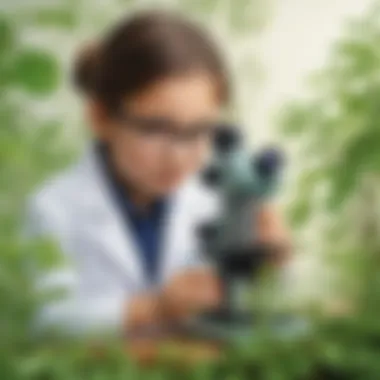Engaging Science Projects for Preschoolers: A Guide for 4-Year-Olds


Fun Activities Ideas
Developing science projects for 4-year-olds can be an exhilarating and stimulating journey. Whether conducting experiments indoors, embarking on outdoor explorations, engaging in arts and crafts, or venturing into the world of cooking and baking, there are endless opportunities to ignite young minds and nurture a passion for science at an early age. These activities are meticulously designed to encourage hands-on learning, critical thinking, and most importantly, fun-filled moments of discovery. Here, we delve into a selection of captivating projects tailored specifically for the curious minds of preschoolers.
- Indoor Activities Introducing 4-year-olds to the wonders of science within the confines of indoor spaces opens up a realm of possibilities. From simple experiments showcasing basic scientific principles to sensory exploration activities that stimulate curiosity, indoor science projects provide a versatile platform for young learners. Through interactive demonstrations and observation-based tasks, children can grasp fundamental concepts while honing their cognitive skills in a controlled and comfortable environment.
- Outdoor Adventures Venturing outdoors offers 4-year-olds the chance to engage with science in a hands-on and dynamic manner. Nature walks, garden exploration, and outdoor experiments not only promote physical activity but also instill a deep appreciation for the natural world. By encouraging children to observe, question, and explore the outdoor environment, educators and guardians can foster a sense of wonder and curiosity that forms the cornerstone of scientific exploration.
- Arts and Crafts Infusing creative expression with scientific inquiry, arts and crafts projects provide a holistic approach to learning for young children. From making homemade lava lamps to constructing simple machines using everyday materials, arts and crafts activities not only enhance fine motor skills but also encourage innovation and problem-solving. By blending artistic ingenuity with scientific concepts, 4-year-olds can develop a well-rounded understanding of the interconnectedness of art and science.
- Science Experiments Conducting age-appropriate science experiments tailored for 4-year-olds is an enriching way to promote discovery and experimentation. Simple projects like creating erupting volcanoes, exploring buoyancy with sink-or-float experiments, or observing plant growth offer insightful learning experiences. These hands-on experiments not only nurture a sense of curiosity but also cultivate a scientific mindset grounded in observation, prediction, and analysis.
- Cooking and Baking Incorporating cooking and baking activities into early science education can be both educational and enjoyable for young learners. From understanding the chemical reactions involved in baking cookies to exploring the concepts of measurement and temperature in cooking, culinary experiments provide a delectable gateway to the world of science. Through hands-on experiences in the kitchen, 4-year-olds can develop a nuanced understanding of scientific principles while honing their culinary skills in a safe and supervised setting.
Introduction
In this section, we embark on a journey delving deep into the realm of science projects catered specifically to the inquisitive minds of 4-year-olds. As we navigate through these immersive and enlightening activities, our primary focus remains on igniting a spark of curiosity, promoting hands-on learning experiences, and nurturing a genuine fondness for the wonders of science right from a tender age. The significance of introducing science at this early stage in a child's development cannot be overstated, as it lays the foundation for a lifelong passion for exploration and discovery.
Welcome to the World of Science Exploration
Prepare to immerse your young learners into the captivating world of scientific inquiry. The concept of setting the stage for early scientific exploration is a pivotal cornerstone in fostering a child's innate curiosity and inquisitiveness. By emphasizing hands-on experimentation, observation, and critical thinking, we pave the way for a future generation of astute scientists and innovators.
Setting the Stage for Early Scientific Inquiry
Dive into the essence of introducing young minds to the wonders of scientific inquiry. This fundamental aspect plays a crucial role in shaping a child's cognitive development and instilling a sense of wonder and curiosity about the natural world. The key characteristic of setting the stage for early scientific inquiry lies in its ability to nurture problem-solving skills, enhance analytical thinking, and promote a questioning attitude in our young learners. This approach not only cultivates a deeper understanding of scientific concepts but also encourages a sense of wonder and exploration that is essential for early childhood development.
With a focus on encouraging hands-on exploration and engaging sensory experiences, setting the stage for early scientific inquiry provides a dynamic and interactive learning environment that sparks creativity and nurtures a sense of curiosity in young children. By empowering children to ask questions, make observations, and draw conclusions based on their own investigations, this approach fosters a sense of ownership over the learning process and cultivates a lifelong love for learning and discovery.
Benefits of Introducing Science to Four-Year-Olds
Introducing science to four-year-olds plays a pivotal role in shaping their cognitive development and overall growth. At this tender age, engaging in scientific exploration can have a profound impact on various aspects of a child's development. One crucial benefit is in enhancing problem-solving skills. By immersing young minds in problem-solving activities, children learn to analyze situations, think critically, and develop effective solutions. This fosters a capacity for innovation and creative thinking from an early age, setting a strong foundation for future academic and real-world challenges. Moreover, introducing science at this age nurtures a sense of curiosity and exploration. Children are naturally inquisitive, and by exposing them to scientific concepts and experiments, we can encourage and channelize their curiosity into structured exploration. This not only fuels their interest in learning but also instills a lifelong love for discovery and knowledge acquisition.
Cognitive Development


Enhancing Problem-Solving Skills
Engaging four-year-olds in activities that enhance problem-solving skills is instrumental in their cognitive development. Through problem-solving tasks, children learn to identify challenges, brainstorm possible solutions, and implement strategies to overcome obstacles. This process not only sharpens their analytical thinking but also cultivates resilience and adaptability. The unique feature of enhancing problem-solving skills is its ability to promote independent thinking and decision-making in children, empowering them to approach problems with confidence and creativity. While these activities may pose challenges, they provide valuable learning opportunities that scaffold a child's problem-solving abilities, preparing them for future academic and real-life scenarios.
Fostering Curiosity and Exploration
Fostering curiosity and exploration in four-year-olds is essential for cultivating a passion for learning and engaging with the world around them. By encouraging children to ask questions, make observations, and test hypotheses, we stimulate their intellectual curiosity and ignite a sense of wonder about the natural phenomena. This aspect not only boosts children's engagement with science but also enhances their communication skills and cognitive flexibility. The beauty of fostering curiosity is that it lays the foundation for a growth mindset, instilling in children the belief that challenges are opportunities for exploration and learning. By nurturing this curiosity early on, we prepare children to approach new concepts with openness and eagerness, fostering a lifelong love for discovery.
Motor Skills Enhancement
Developing Fine Motor Skills through Hands-On Activities
Engaging in hands-on activities tailored to enhance fine motor skills is a beneficial approach for four-year-olds. Active participation in activities like manipulating objects, sorting items, and conducting experiments helps children refine their hand-eye coordination, dexterity, and precision. The interactive nature of these activities not only sharpens fine motor skills but also enhances children's focus, attention to detail, and spatial awareness. An essential benefit of developing fine motor skills through hands-on activities is its ability to enhance children's overall manipulative abilities, preparing them for tasks that require precision and coordination in various contexts.
Language and Communication Development
Building Vocabulary through Science Concepts
Employing science concepts to build vocabulary among four-year-olds is a strategic method to enrich their language and communication skills. Introducing scientific terms, discussing observations, and describing experiments allow children to expand their lexicon and articulate their thoughts more effectively. The key characteristic of building vocabulary through science concepts is its ability to contextualize language learning within practical and engaging experiences, making the process more immersive and enjoyable. By associating words with tangible experiences and concrete examples, children can internalize new vocabulary more effectively and apply it in different contexts. This approach not only enhances language skills but also fosters scientific literacy and enables children to communicate complex ideas with clarity and precision.
Science Project Ideas
In this article, exploring science project ideas for 4-year-olds opens up a world of discovery and learning unique to early childhood education. These projects serve as crucial building blocks in shaping young minds and cultivating a curiosity for science from a tender age. Introducing children to scientific concepts through hands-on activities at this stage lays a robust foundation for future learning and critical thinking skills. Science project ideas not only entertain but also play a pivotal role in fostering cognitive and motor skills while enhancing language development.
Color Mixing Experiments


Delving into color mixing experiments for young children uncovers an exciting realm where primary colors harmonize to form a spectrum of new hues. This specific aspect of color exploration enables kids to grasp the basics of color theory and understand how different shades come into existence through simple combinations. Creating new hues with primary colors captivates young learners and sparks their imagination as they witness the magical transformation before their eyes. The hands-on nature of this activity not only engages their senses but also enhances their understanding of color properties.
Sink or Float Activity
Introducing the sink or float activity underscores the principles of density and buoyancy, offering children a tangible way to explore these scientific concepts firsthand. Discovering the behavior of objects submerged in water instills a sense of wonder and critical thinking in young minds, encouraging them to predict outcomes and draw conclusions based on their observations. This hands-on experiment serves as a fun introduction to physics and fluid dynamics, igniting a passion for scientific inquiry in 4-year-olds as they playfully uncover the secrets of displacement and buoyant force.
Nature Scavenger Hunt
Embarking on a nature scavenger hunt blends outdoor exploration with the joy of identifying natural items, immersing young children in the beauty and diversity of the natural world. This specific aspect of scientific engagement nurtures a sense of curiosity and environmental awareness, prompting kids to observe, categorize, and collect natural treasures while connecting with their surroundings. Exploring the outdoors and identifying natural items not only enhances observational skills but also instills a deep appreciation for biodiversity and ecological harmony in budding scientists.
Simple Weather Observations
Engaging in simple weather observations equips kids with the tools to record and analyze daily weather patterns, fostering an interest in meteorology and atmospheric phenomena. This specific aspect of scientific exploration empowers young learners to become amateur meteorologists, recording temperature changes, cloud formations, and precipitation types with excitement and curiosity. Recording daily weather patterns sharpens observational skills and encourages children to make connections between weather conditions and seasonal changes, laying the groundwork for understanding complex climate concepts in the future.
Seed Planting Experiment
Conducting a seed planting experiment offers young children the opportunity to witness the miraculous journey of seed growth and plant development up close. This hands-on activity not only teaches the principles of germination and plant life cycles but also instills a sense of responsibility and care for the environment in budding botanists. Observing seed growth and plant development unlocks a world of botanical wonders for 4-year-olds, allowing them to witness the magic of nature unfold before their eyes and nurturing a deep connection with the natural world.
Guidelines for Carrying Out Science Activities
When it comes to introducing science to 4-year-olds, one must establish robust guidelines encompassing safety and learning efficacy. The importance of proper guidance cannot be overstated, especially at such a formative age. By structuring activities under well-thought-out principles, both children and facilitators can navigate the world of science with confidence.
The critical aspect of guidelines for conducting science activities lies in ensuring a safe and enriching environment for young learners. Safety considerations encompass not only physical precautions but also emotional and cognitive well-being. By implementing age-appropriate materials and fostering a nurturing atmosphere, children can explore scientific concepts without undue risks.
Moreover, guidelines play a pivotal role in delineating clear objectives and methods, enhancing the effectiveness of scientific exploration. By providing a framework for conducting activities, guidelines scaffold the learning process, promoting organization and consistency. This structured approach fosters understanding and retention of scientific principles in a manner suited for young minds.


Safety First
Supervision and Age-Appropriate Materials
Supervision and the use of age-appropriate materials are paramount considerations in ensuring a safe and engaging scientific environment for 4-year-olds. The essence of appropriate supervision lies in the continuous monitoring and guidance provided by adults to mitigate potential risks and enhance learning outcomes.
Incorporating age-appropriate materials is essential in tailoring activities to the developmental stage of young children. These materials are specifically designed to be safe, intuitive, and conducive to hands-on exploration. By aligning materials with the cognitive and physical abilities of 4-year-olds, supervision becomes a more effective tool in creating meaningful scientific experiences.
The unique feature of supervision and age-appropriate materials lies in their ability to strike a balance between safety and learning engagement. While ensuring a secure environment, these elements also encourage curiosity and experimentation, nurturing a sense of discovery in young learners. By providing the necessary support and resources, supervision and age-appropriate materials enhance the quality of scientific exploration for 4-year-olds.
Encouraging Inquiry
Promoting Questions and Exploratory Thinking
Encouraging inquiry through the promotion of questions and exploratory thinking is a fundamental aspect of cultivating scientific curiosity in young children. By fostering a culture of questioning and exploration, caregivers and educators can stimulate cognitive development and critical thinking skills.
The key characteristic of promoting questions and exploratory thinking is its ability to ignite curiosity and creativity in 4-year-olds. By encouraging children to ask 'why' and 'how,' caregivers instill a sense of inquiry that forms the foundation for scientific investigation. This approach not only deepens understanding but also nurtures a spirit of lifelong learning.
A unique feature of promoting questions and exploratory thinking is its capacity to empower children in their learning journey. By creating a safe environment for questioning and experimentation, caregivers enable young learners to take ownership of their scientific exploration. This autonomy fosters independence and confidence, essential qualities for future academic and personal success.
Conclusion
In the realm of exploring science projects tailored for 4-year-olds, the conclusion serves as the pinnacle of this insightful guide, encapsulating the essence and significance of nurturing young scientific minds at an early age. As parents, teachers, and caregivers engage with the enriching activities detailed throughout this article, the importance of fostering a curiosity-driven approach to learning becomes unmistakably clear. By immersing young learners in hands-on experiments and interactive explorations, a profound impact is made on their cognitive development, motor skills enhancement, and language acquisition abilities.
Encouraging a passion for science from the tender age of 4 opens doors to a lifetime filled with discovery and innovation. This final section emphasizes the lasting benefits of instilling a love for scientific inquiry during the formative years, setting the stage for a future generation of critical thinkers and problem solvers.
Nurturing a Young Scientist
In the aspect of fostering a lifelong passion for learning, the core objective lies in igniting a spark of curiosity that will continue to blaze brightly throughout a child's academic journey. By actively engaging children in scientific experiments and observations, the process of instilling a thirst for knowledge becomes a natural extension of their everyday experiences. Fostering a lifelong passion for learning involves creating a nurturing environment where questions are encouraged and inquiry is celebrated.
The key characteristic of fostering a lifelong passion for learning is its ability to transform conventional education into a captivating journey of discovery. By blending playfulness with educational principles, this approach makes learning a joyful and enriching endeavor for young minds. The uniqueness of this strategy lies in its seamless integration of fun and learning, ensuring that children develop a deep appreciation for knowledge while honing their critical thinking skills.
Elevating the learning experience through a focus on lifelong passion not only enhances academic performance but also cultivates a mindset of continuous growth and exploration. This approach empowers young learners to embrace challenges with enthusiasm, viewing obstacles as opportunities for further understanding and mastery. The advantages of nurturing a lifelong passion for learning in this article extend beyond academic excellence to encompass holistic development and a lasting love for the pursuit of knowledge.



